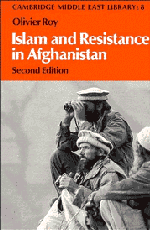Book contents
- Frontmatter
- Contents
- Acknowledgements
- Maps
- Introduction
- 1 State and society in Afghanistan
- 2 Islam in Afghanistan
- 3 The origins of Afghan fundamentalism and popular movements up to 1947
- 4 The Islamist movement up to 1978
- 5 The communist reforms and the repression, 1978–9
- 6 The uprisings, 1978–9
- 7 The establishments of political parties
- 8 The development of the parties between 1980 and 1984
- 9 The role of the Shiʿa in the resistance
- 10 Society and the war
- 11 From freedom fighter to guerilla
- 12 Military operations
- 13 The conflict from 1986 to the Soviet withdrawal
- 14 Cultural patterns and changes in society: an assessment
- 15 Afghan politics and the outside world
- Appendixes
- Notes
- Bibliography
- Index
Introduction
- Frontmatter
- Contents
- Acknowledgements
- Maps
- Introduction
- 1 State and society in Afghanistan
- 2 Islam in Afghanistan
- 3 The origins of Afghan fundamentalism and popular movements up to 1947
- 4 The Islamist movement up to 1978
- 5 The communist reforms and the repression, 1978–9
- 6 The uprisings, 1978–9
- 7 The establishments of political parties
- 8 The development of the parties between 1980 and 1984
- 9 The role of the Shiʿa in the resistance
- 10 Society and the war
- 11 From freedom fighter to guerilla
- 12 Military operations
- 13 The conflict from 1986 to the Soviet withdrawal
- 14 Cultural patterns and changes in society: an assessment
- 15 Afghan politics and the outside world
- Appendixes
- Notes
- Bibliography
- Index
Summary
What interests us in an account of the Afghanistan resistance movement? Has this movement already receded into the past, its history to be written as an obituary? Such resignation in the face of a defeat which has not yet occurred presupposes a specific view of history: that nothing can stand in the way of the Soviet system and that when it has steamrollered its way across a country steeped in the age-old traditions of Islam, something fundamentally new will be born, obliterating the past. This is the posthumous triumph of Marxism over those very people who oppose it, yet accept that its ultimate victory is assured.
Even though the resistance movement cannot hope for a clear-cut military victory, no-one can deny that guerilla wars are political wars and that in the end the slow wearing away of a colonial power may still be decisive. Whatever the outcome of this war, the Soviet system is evolving, as is the contemporary world of Islam. The Afghan resistance movement lies at the intersection of these two histories. Far from being a mere spontaneous revolt, it has its roots in the popular Muslim uprisings of the past and also in the current of Islamic reformism, which runs from Shah Waliullah to the contemporary so-called fundamentalists. This story, as yet untold, will increase our understanding of the link between Islam and the popular movements.
- Type
- Chapter
- Information
- Islam and Resistance in Afghanistan , pp. 1 - 9Publisher: Cambridge University PressPrint publication year: 1990



